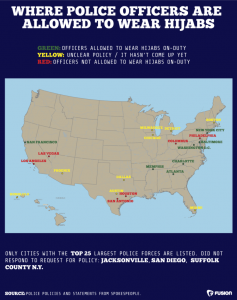WASHINGTON – As Canadian and British police allowed hijab as part of their forces’ uniform, American states are still divided on allowing the Islamic headscarf, banning it, or having no clear policy.
“We don’t know” what the answer would be, Steve McNulty, a spokesperson for the Boston Police Department, told Fusion, noting that they had no policy on the hijab as no officer has requested to wear one.
“It wouldn’t be a matter of us saying no to it because we have an issue with it, it could just be a safety issue… If someone grabbed the headwear and could the officer pull away, that’s the only thing we can think of.”
Last week, the Royal Canadian Mounted Police approved a new policy allowing their officers to wear hijab, the headscarf for Muslim women, while on duty.
The change for the iconic mounties was made to “reflect the diversity in our communities” and encourage more Muslim women to join the force, a spokesperson said.
The situation was not that clear in America, where police departments remain unclear on whether to allow female Muslim officers to wear hijabor not.
Of the 25 largest police departments in the country, seven allow officers to wear hijab while on duty, according to Fusion’s reporting.
Six others do not allow it, while the rest either have no clear policy in place or did not respond to a request for their policy.
The police departments of New York City, Washington DC, Baltimore, Memphis, San Francisco, Atlanta and Charlotte have all employed officers who wear hijab.
On the other hand, officers in Los Angeles, Philadelphia, Houston, Las Vegas, San Antonio and Columbus, Ohio are not allowed to wear hijabon duty.
“We’re in the business of defending peoples’ freedom and liberty,” said Lt. David Robinson, a spokesperson for the Charlotte-Mecklenburg Police Department.
“We would not infringe on officers’ beliefs.”

Inclusion
Amid growing scrutiny in the past few years over the lack of diversity in many US police departments, Muslim community advocates say allowing hijab is an important step toward inclusion.
“I think the general trend is toward acceptance of the hijab by law enforcement,” said Ibrahim Hooper, a spokesperson for the Council on American-Islamic Relations (CAIR).
“That’s just a natural trend as they seek to make a more diverse force. If you don’t allow it, you’re excluding Muslim women who seek to practice their faith.”
The issue of police uniform hijab has been controversial recently.
A female Muslim police officer in Philadelphia sued her department for discrimination in 2005 after she was disciplined for wearing a hijab , but a federal judge ruled against her and the decision was upheld on appeal.
More recently, the Columbus police department ran into controversy when it prohibited a police recruit from wearing hijab last year.
Hooper, the spokesperson for CAIR, said that departments that didn’t allow hijab-wearing officers wouldn’t be as effective in serving Muslim communities.
“You can make a standard hijab, you can have a logo on it or whatever you want,” he said.
“It’s just something that is needed if you want to have a diverse force.”
Earlier this week, Turkey allowed female police officers to don hijab.
The move follows earlier announcement by Police Scotland which declared hijab an optional part of its uniform to encourage more female Muslims to consider policing as a career option.
Similarly in Canada, the government announced just this week that the Royal Canadian Mounted Police would allow its officers to wear hijab as part of their uniforms, in the hope of boosting the number of female Muslim recruits.
